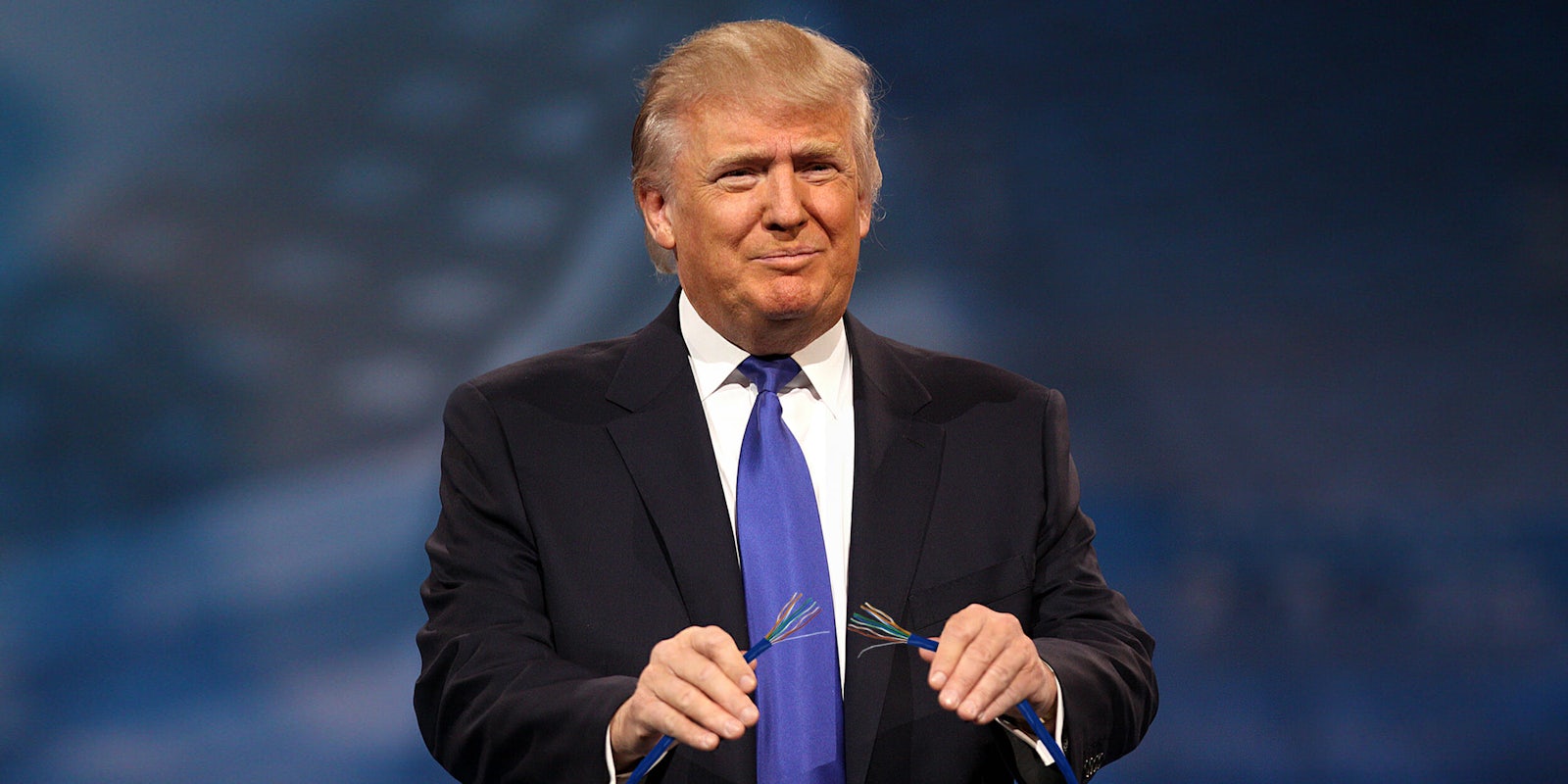President Donald Trump on Friday said he wanted to “cut off” the internet to prevent the so-called Islamic State from using it to entice new recruits following an apparent terrorist attack in London.
“Loser terrorists must be dealt with in a much tougher manner,” Trump wrote. “The internet is their main recruitment tool which we must cut off & use better!”
At least 22 people were injured following an explosion in the London Tube on Friday. While British authorities are treating the incident as a terrorist attack, they have not yet concluded that it is.
Trump’s latest call for a crackdown on the open internet reveals a new willingness to use authoritarian measures in the name of national security.
Loser terrorists must be dealt with in a much tougher manner.The internet is their main recruitment tool which we must cut off & use better!
— Donald J. Trump (@realDonaldTrump) September 15, 2017
It is unclear what Trump means by “cut off” the internet or how to “use” the internet “better.” The White House did not immediately respond to a request to clarify the president’s statement.
ISIS has successfully used the internet as a recruitment tool for years, with unnumbered Westerners deciding to join the militant organization after connecting with their hardline ideologies over social media. Syed Farook and Tashfeen Malik, who killed 14 people in San Bernardino, California, in 2015, are believed to have been inspired to carry out the attack by ISIS’s online propaganda.
Friday’s statement is the second time Trump has publicly suggested using internet censorship to combat terrorism. On the campaign trail in December 2015, Trump suggested “closing that internet up in some way” due to terrorist activity online.
“We’re losing a lot of people because of the internet. And we have to do something,” Trump said. “We have to go see Bill Gates and a lot of different people that really understand what’s happening. We have to talk to them—maybe, in certain areas, closing that internet up in some way.”
#DonaldTrump advocates closing up the Internet 2 stop the process of thought/free speech. So Communist China-like. pic.twitter.com/hRab3xpVcK
— NotBuffytheVMPslayer (@NotBUFFY_VS) December 8, 2015
Trump is far from the only politician to propose internet censorship as a means to combat the spread of terrorism. In fact, his 2016 Democratic opponent, Hillary Clinton, echoed Trump’s sentiments, suggesting the U.S. “deny online space” to terrorists.
“We’re going to hear all the usual complaints,” Clinton said in 2015, “you know, freedom of speech, et cetera. But if we truly are in a war against terrorism and we are truly looking for ways to shut off their funding, shut off the flow of foreign fighters, then we’ve got to shut off their means of communicating. It’s more complicated with some of what they do on encrypted apps, and I’m well aware of that, and that requires even more thinking about how to do it.”
Counterterrorism experts do not all agree that restricting internet access or imposing internet censorship is the answer to radical extremism.
Seamus Hughes, deputy director of the Program on Extremism at George Washington University’s Center for Cyber & Homeland Security, argues that in-person relationships play a far more important role in radicalization than any efforts on social media. As Hughes wrote in an article for Lawfare in August 2016:
While instances of purely web-driven, isolated radicalization exist, in most cases, U.S.-based individuals cultivated, and later strengthened, their interest in ISIS’s narrative through in-person relationships. To say ‘the internet’ is the driving factor of radicalization among American ISIS supporters is a vast over-simplification. Of course, the online environment allows for greater interaction among would-be recruits. Unsurprisingly, a recent study found that in 89 percent of the cases of American ISIS recruits “involved social media.” But in many ways, the online personas ISIS supporters assume simply reflect their offline beliefs, even if they show few outward signs of these beliefs. More often than not, online and offline dynamics complement one another.
Still, ISIS’s ability to use the internet to inspire radicalization and attacks is real. Other experts say these efforts provide an opportunity to disrupt the radicalization process.
J.M. Berger, a fellow with the International Center for Counter-Terrorism at the Hague and co-author of ISIS: The State of Terror, writes in VOX-Pol that law enforcement and intelligence agencies can disrupt online ISIS recruitment efforts so long as they “function as robustly as the recruitment efforts themselves, contesting ISIS at each opportunity.”
“One of the virtues of social media is that it forces human interactions into a relatively strict structure, which in turn allows us to diagnose the process behind and interaction, and recognize processes when they repeat,” he writes. “We can be smarter and more effective in how we counter ISIS on social media by stripping away the mystique and focusing on the mechanics.”
For Trump, however, “focusing on the mechanics” may lead him to crash the whole machine.


